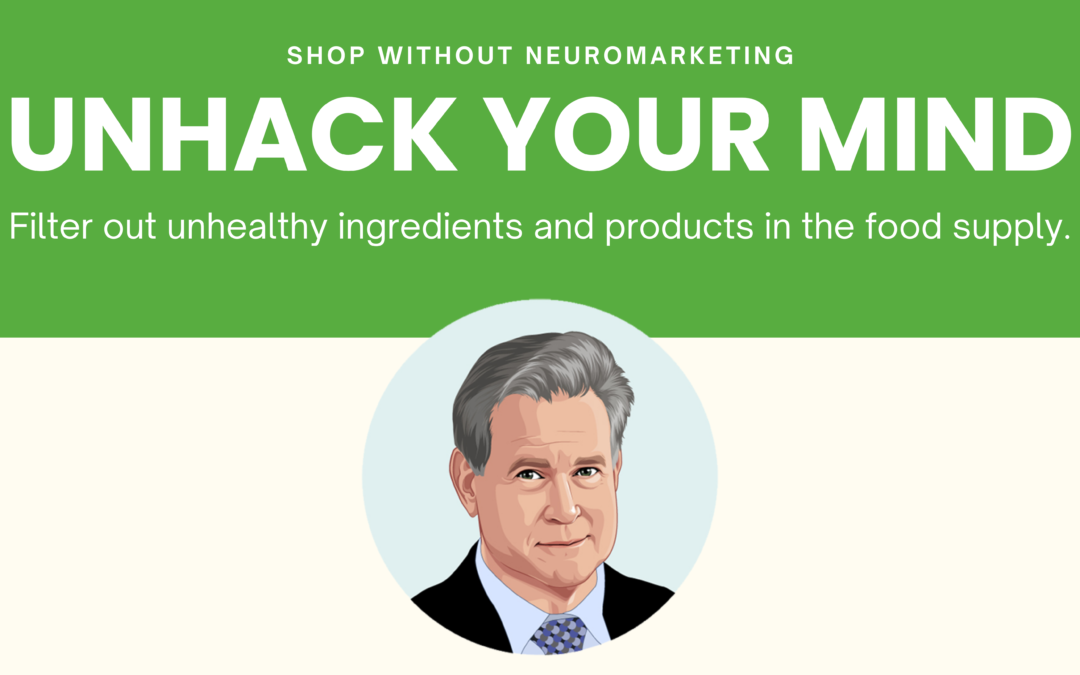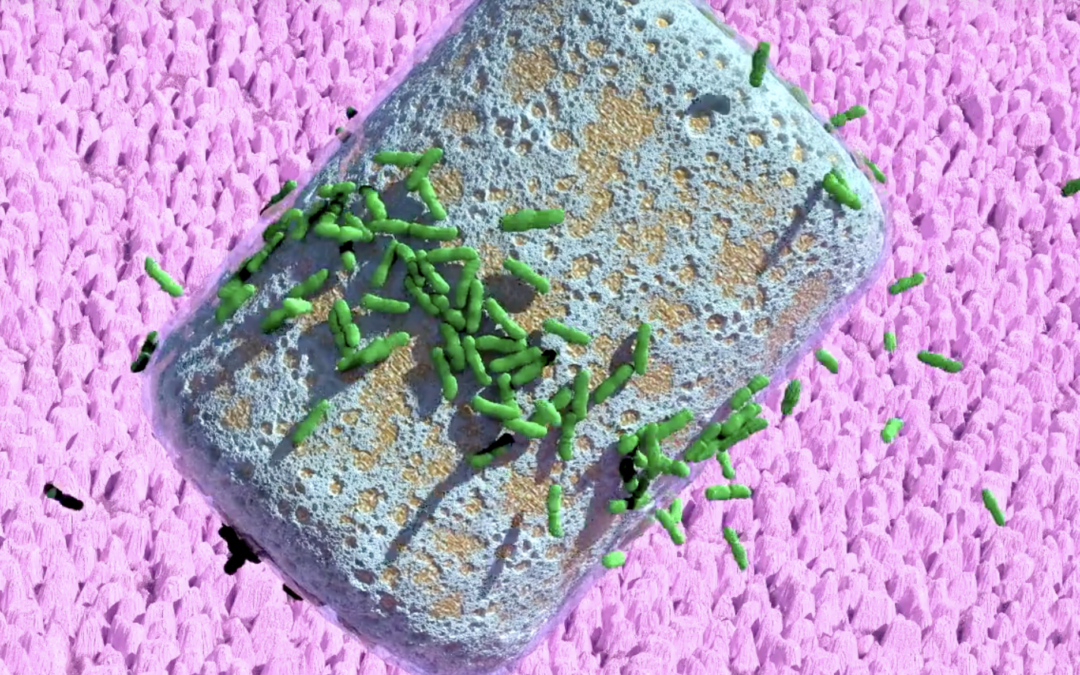
Obesogens: a unifying theory for the global rise in obesity
- Obesity is biochemistry.
- The behavior is a result of the biochemistry.
- Bad diets cause obesity through REDOX generation.
- Prevention is the only solution.


UNHACK YOUR FOOD AND BEVERAGE PURCHASING
Did you know there is a “science” to hacking your mind and your purchasing behavior? It is called “neuromarketing,” and it is being deployed by an army of marketing specialists who have made it their business to manipulate your decisions regarding purchases of foods and beverages.
When “Hacking of the American Mind” was published in 2017, I pointed out that in the last forty years, government legislation and subsidies have promoted ever-available temptation (sugar, drugs, social media, porn) combined with constant stress (work, home, money, Internet), with the end result of an unprecedented epidemic of addiction, anxiety, depression, and chronic disease. And with the advent of neuromarketing, corporate America has successfully imprisoned us in an endless loop of desire and consumption from which there is no obvious escape.
But now there is an obvious escape, at least from harmful foods and beverages.
Simply filter them out effortlessly, using cutting-edge new technology that works in the opposite way that neuromarketing does.
I have worked with an innovative new startup called Perfact to develop paradigm-shifting tools that empower you and your knowledge about foods and beverages to make rational, informed decisions based on science-based criteria easily and quickly.
My new “no added sugar” solution filters out 74% of packaged goods in the food supply that contain added sugar. With 262 forms of added sugar currently in the food supply, reducing sugar consumption by simply reading the labels would be an impossible task.
I also provide a “safe added sugar filter” that allows just enough sugar to stay within guidelines established by leading health authorities. Once you eliminate products with added sugar, you might also want to consider what types of sweeteners are used, so I provide several filters for these ingredients as well.
I’m asking everyone in our movement to try out the FREE Perfact solutions and to help provide feedback on the experience. It is a new technology, supporting consumers in a fundamentally new way, so please become part of this important movement to unhack your shopping experience, transform the way you shop, and change the food system for the better.
Simply click here and visit my website to learn more and try out the Perfact filters for FREE and with no cumbersome sign-up required!

The food choices we make have a major influence on our health and environment and the welfare of the people and animals who ultimately make our food.
Nevertheless, research and education efforts haven’t yet resulted in a major shift in food buying patterns. We want to know more about your goals and ideals when buying food – and what prevents you from fulfilling them.
Along with the Hypoglycemia Support Foundation, I support this survey sponsored by perfact.co, a startup that seeks to take the guesswork, challenges, and pain out of finding the products that are right for you without compromising your privacy or “paying with your data”.
Years in the making, check out the survey results to date. Over 2,000 respondents so far!
http://surveyresults.perfact.
If you haven’t taken the survey yet, there is a link at the bottom of the survey results page.
Sincerely,
Dr. Robert H. Lustig
Ultraprocessed food is established as a metabolic disruptor acting to increase adiposity, reduce mitochondrial efficiency, drive insulin resistance, alter growth, and contribute to human morbidity and mortality. Consumer packaged goods (CPG) companies are beginning to understand the detrimental impact of the food they market, and have employed substitution strategies to reduce salt, sugar, and fat. However, the harms of ultraprocessed foods are far more complex than any single component, and are not ameliorated by such simple substitutions. Over the past 2 years, the authors have worked with the Kuwaiti Danish Dairy Company (KDD) to conduct a comprehensive scientific evaluation of their entire commercial food and beverage portfolio. Assay of the macronutrients, micronutrients, additives, and toxins contained in each of their products was undertaken to determine the precise nature of each product’s ingredients as well as the health impacts of processing. The authors formed a Scientific Advisory Team (SAT) and developed a tiered “Metabolic Matrix” founded in three science-based principles: (1) protect the liver, (2) feed the gut, and (3) support the brain. The Metabolic Matrix categorizes each product and provides the criteria, metrics, and recommendations for improvement or reformulation. Real-time consultation with the KDD Executive and Operations teams was vital to see these procedures through to fruition. This scientific exercise has enabled KDD to lay the groundwork for improving the health, well-being, and sustainability of their entire product line, while maintaining flavor, economic, and fiscal viability. This process is easily transferrable, and we are sharing this effort and its approaches as a proof-of-concept. The key aim of our work is to not only make ultraprocessed food healthier but to urge other food companies to implement similar analysis and reformulation of their product lines to improve the metabolic health and well-being of consumers worldwide.
In the podcast Sugar – A Chronic Toxin? I discuss with @lizctucker how the sugar fructose is addictive, drives fatty liver disease, and accelerates the aging process.

I’ve spent the last 25 years investigating the causes and treatments of chronic disease
(obesity, diabetes, fatty liver disease) in children and adults. I can sum up my research career in three simple precepts:
All of this has led me to determine that our processed food diet is the primary culprit. It is high-sugar, low-fiber, toxic, addictive, ubiquitous, and detrimental to society. Therefore, I’ve dedicated my efforts to reduce its impact on people and the environment.
I’ve also determined that processed food is not going away, no matter how I may want it to. Partly because it’s cheap, partly because it’s convenient, and partly because it’s addictive.
I’m for fixing the problem any way I can. Society can do this in two ways:
Reducing availability is problematic, as the industry keeps pushing it, the public keeps demanding it, and the government keeps ignoring it. I’m doing what I can, most recently publishing a white paper to provide a roadmap for processed food reduction.
But reducing harm may be a bit easier. To help sick people get better, I’ve teamed up with a group of materials science engineers to develop a proprietary fiber that will absorb sugars in the intestine, thus protecting the liver and feeding the gut, thus mitigating some of the toxic effects of processed food. The company is called BioLumen Technologies. It is very exciting and has generated interest within the processed food industry, most recently PepsiCo.
Some may question this strategy, as it would seem to be the antithesis of my message, and it looks on the surface like a “get out of jail free” card to patients, a “carte blanche” to the industry, and like I am “selling out”. Not true. You can’t let the perfect be the enemy of the good. People are hurting, people are dying, and COVID is making it worse. To stick to “principle” is to turn my back on these people. I’ve never taken a dime from the food industry, and I’m not starting now. I derive no salary from BioLumen, and I am not on Pepsi’s payroll. I’m just trying to fix the problem any way I can, using my research, knowledge, and expertise.
This fits well within my Hippocratic Oath and my oath to you, the public. Fix the problem. But you can’t fix a problem if you don’t know what the problem is. Everything I have learned so far in this amazing journey tells me that I do. If the processed food and beverage industry can figure it out too, then all to the better.
Recent Comments